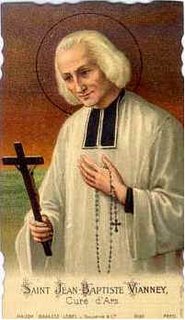
Anger is an emotion of the soul, which leads us violently to repel whatever hurts or displeases us.
This emotion, my children, comes from the devil: it shows that we are in his hands; that he is the master of our heart; that he holds all the strings of it, and makes us dance as he pleases. See, a person who puts himself in a passion is like a puppet; he knows neither what he says, nor what he does; the devil guides him entirely. He strikes right and left; his hair stands up like the bristles of a hedgehog; his eyes start out of his head--he is a scorpion, a furious lion. . . . Why do we, my children, put ourselves into such a state? Is it not pitiable? It is, mind, because we do not love the good God. Our heart is given up to the demon of pride, who is angry when he thinks himself despised; to the demon of avarice, who is irritated when he suffers any loss; I to the demon of luxury, who is indignant when his pleasures are interfered with. . . . How unhappy we are, my children, thus to be the sport of demons? They do whatever they please with us; they suggest to us evil-speaking, calumny, hatred, vengeance: they even drive us so far as to put our neighbour to death. See, Cain killed his brother Abel out of jealousy; Saul wished to take away the life of David; Theodosius caused the massacre of the inhabitants of Thessalonica, to revenge a personal affront. . . . If we do not put our neighbour to death, we are angry with him, we curse him, we give him to the devil, we wish for his death, we wish for our own.
In our fury, we blaspheme the holy Name of God, we accuse His Providence. . . . What fury, what impiety! And what is still more deplorable, my children, we are carried to these excesses for a trifle, for a word, for the least injustice! Where is our faith! Where is our reason? We say in excuse that it is anger that makes us swear; but one sin cannot excuse another sin. The good God equally condemns anger, and the excesses that are its consequences. . . . How we sadden our guardian angel! He is always there at our side to send us good thoughts, and he sees us do nothing but evil. . . . If we did like Saint Remigius, we should never be angry. See, this saint, being questioned by a Father of the desert how he managed to be always in an even temper, replied, "I often consider that my guardian angel is always by my side, who assists me in all my needs, who tells me what I ought to do and what I ought to say, and who writes down, after each of my actions, the way in which I have done it. "
Philip II, King of Spain, having passed several hours of the night in writing a long letter to the Pope, gave it to his secretary to fold up and seal. He, being half asleep, made a mistake; when he meant to put sand on the letter, he took the ink bottle and covered all the paper with ink. While he was ashamed and inconsolable, the king said, quite calmly, "No very great harm is done; there is another sheet of paper"; and he took it, and employed the rest of the night in writing a second letter, without showing the least displeasure with his secretary.
Read more on St. John Vianney
 . He made the Gloria part of the liturgy; however, the Gloria was only to be sung on Christmas.
. He made the Gloria part of the liturgy; however, the Gloria was only to be sung on Christmas.














